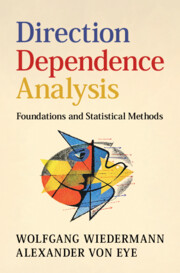Book contents
- Direction Dependence Analysis
- Direction Dependence Analysis
- Copyright page
- Contents
- Preface
- Chapter 1 Introduction
- Chapter 2 The Linear Regression Model
- Chapter 3 Asymmetry Properties of Distributions of Observed Variables
- Chapter 4 Asymmetry Properties of Error Distributions
- Chapter 5 Independence Properties of Causes and Errors
- Chapter 6 Direction of Dependence under Latent Confounding
- Chapter 7 The Integrated Framework of Direction Dependence Analysis
- Chapter 8 Stability and Sensitivity Analyses
- Chapter 9 Extensions and Applications
- Chapter 10 Statistical Software
- Chapter 11 Concluding Remarks
- References
- Index
Chapter 9 - Extensions and Applications
Published online by Cambridge University Press: 16 September 2025
- Direction Dependence Analysis
- Direction Dependence Analysis
- Copyright page
- Contents
- Preface
- Chapter 1 Introduction
- Chapter 2 The Linear Regression Model
- Chapter 3 Asymmetry Properties of Distributions of Observed Variables
- Chapter 4 Asymmetry Properties of Error Distributions
- Chapter 5 Independence Properties of Causes and Errors
- Chapter 6 Direction of Dependence under Latent Confounding
- Chapter 7 The Integrated Framework of Direction Dependence Analysis
- Chapter 8 Stability and Sensitivity Analyses
- Chapter 9 Extensions and Applications
- Chapter 10 Statistical Software
- Chapter 11 Concluding Remarks
- References
- Index
Summary
Chapter 9 introduces extensions and presents applications of Direction Dependence Analysis. Specifically, it focuses on probing the causal direction of effects in moderated regression (i.e., Conditional Direction Dependence Analysis; CDDA), mediation, and nonlinear models. CDDA allows researchers to detect potential reverse causation and confounding biases of conditional variable relations. CDDA components can be used to identify value regions of a continuous moderator or groups of a categorical moderator that differ in the direction of causation of x and y or the magnitude of hidden confounding. Furthermore, DDA is introduced in the context of mediation models, that is, mechanisms in which a causal effect of x on y is transmitted via a third variable (the mediator). Incorporating principles of direction of dependence in statistical mediation analysis leads to a useful tool for empirically testing the causal inference assumptions embedded in statistical mediation analysis. The chapter closes with a discussion of direction dependence principles for nonlinear variable relations, extensions of DDA’s predictor-error independence component to nonlinear additive models, and discusses DDA in the context of linearizable regression scenarios. The latter opens the door to utilize the full DDA framework under nonlinearity of variable relations.
Information
- Type
- Chapter
- Information
- Direction Dependence AnalysisFoundations and Statistical Methods, pp. 255 - 302Publisher: Cambridge University PressPrint publication year: 2025
Accessibility standard: WCAG 2.2 AAA
Why this information is here
This section outlines the accessibility features of this content - including support for screen readers, full keyboard navigation and high-contrast display options. This may not be relevant for you.Accessibility Information
Content Navigation
Allows you to navigate directly to chapters, sections, or non‐text items through a linked table of contents, reducing the need for extensive scrolling.
Provides an interactive index, letting you go straight to where a term or subject appears in the text without manual searching.
Reading Order & Textual Equivalents
You will encounter all content (including footnotes, captions, etc.) in a clear, sequential flow, making it easier to follow with assistive tools like screen readers.
You get concise descriptions (for images, charts, or media clips), ensuring you do not miss crucial information when visual or audio elements are not accessible.
You get more than just short alt text: you have comprehensive text equivalents, transcripts, captions, or audio descriptions for substantial non‐text content, which is especially helpful for complex visuals or multimedia.
Visual Accessibility
You will still understand key ideas or prompts without relying solely on colour, which is especially helpful if you have colour vision deficiencies.
You benefit from high‐contrast text, which improves legibility if you have low vision or if you are reading in less‐than‐ideal lighting conditions.
